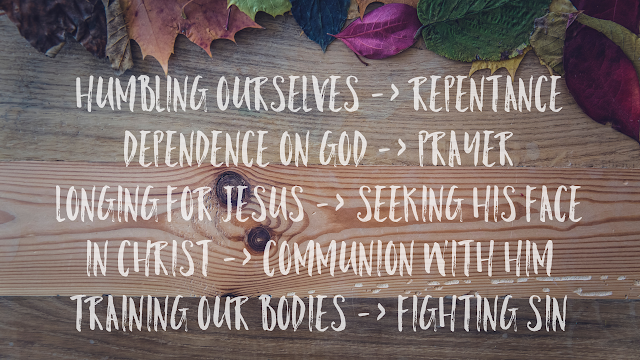Fasting and Prayer
Many churches spend some time in the month of January in prayer and fasting. I know that the whole of the Apostolic Church in Ghana, for example, spends three weeks in prayer and fasting at the beginning of each year. My own local assembly is spending some time over the next few weeks in prayer and fasting too (despite being in Wales rather than Ghana). And so it’s a time of year when lots of people have questions about fasting. A couple of years ago (during the lockdown) I made a few videos with some Scriptural teaching about fasting to help give a clearer biblical picture of what it’s all about (and what it isn’t). In the videos I talk about how the Lord has given fasting to us as a way of humbling ourselves, growing in dependence on Him, longing for Jesus, knowing communion with Him, and training our bodies in the fight against sin. If those would be helpful to you, you can find the 6 videos here.
Through the centuries, Christ’s people have recognised the significance of regular fasting as part of our life of prayer. Andrew Murray, the great South African evangelical saint of the late 19th century, wrote that ‘prayer needs fasting for its full growth.’ Murray is still remembered for his great books on prayer, and yet he had these strong words to say about fasting along with it. But what did he mean? Well, he explains that just as ‘prayer is the one hand with which we grasp the invisible; fasting [is] the other, with which we let loose and cast away the visible’ (Andrew Murray, With Christ in the School of Prayer, London: Nisbet, 1885, p.98). Murray is saying that fasting is a practice which helps us to let go of our dependence on other things — on the things we can see, feel, sense, and (quite literally) taste — in order to grasp hold of the Lord in more complete dependence. By forgoing the strength which comes from our normal food, we are strengthened in our dependence upon the Lord in prayer. And so fasting fuels prayer. Murray goes on to write: ‘We are creatures of the senses: our mind is helped by what comes to us embodied in concrete form; fasting helps to express, to deepen, and to confirm the resolution that we are ready to sacrifice anything, to sacrifice ourselves, to attain what we seek for the kingdom of God’ (p.99).
Before the Azusa Street revival began, William Seymour and the saints in Los Angeles had been praying and fasting together for the outpouring of the Holy Spirit. One visitor to Azusa Street, who was initially convinced that the work of the Holy Spirit there was of the devil rather than of God, was brought to conviction and repentance for this opinion ‘through fasting and prayer and much study of the word’ (from a testimony in The Apostolic Faith 1.4, December 1906, p.3), leading to receiving the baptism in the Spirit.
The early Pentecostals frequently fasted for things they knew they couldn't do, but only God could. So they fasted for revival and for the salvation of souls. They set apart days of prayer and fasting to know more of the Lord’s power at work among them (The Apostolic Faith 1.7, April 1907, p.4). When they had a convention (or a conference), they set aside weeks of prayer and fasting leading up to it (Confidence: A Pentecostal Paper for Great Britain 1.2, May 1908, p.5). They fasted while tarrying for the baptism in the Holy Spirit (The Apostolic Faith 1.7, April 1907, p.4; 1.10, September 1907, p.1; Confidence 2.1, January 1909, p.6; also Agnes Ozman in Topeka) and when praying for healing (The Whole Truth 4.4, October 1911, p.1; The Apostolic Faith, 1.6, March 1907, p.6). And they often fasted in preparation for ordination (The Whole Truth 4.4, October 1911, p.3) or for the Breaking of Bread. They fasted in all these situations, because they knew that in them all they absolutely needed the Lord to work — they knew that they were utterly dependent upon Him.
Fasting isn’t a magic key to twist God’s arm to get Him to answer our prayers. But fasting is a gracious provision from the Lord by which we express our dependence upon Him and He teaches us to grow in our hunger for Him. Fasting points us to the fact that the Lord Himself alone can truly satisfy and encourages us to keep on seeking Him more and more.
